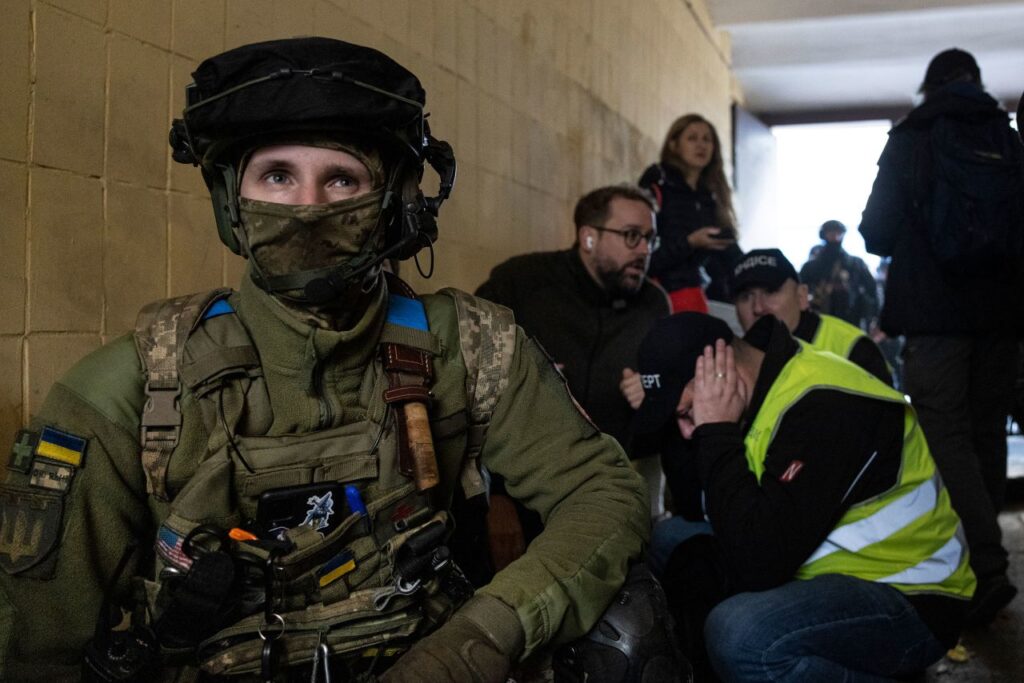Russia launched multiple waves of drones targeting Ukraine’s capital, Kyiv, early on Monday morning. The drone assault, which lasted over five hours, was met with a robust response from Ukraine’s air defense units, who reported successfully intercepting the majority of the threats. According to the Ukrainian military, all drones aimed at Kyiv were either shot down or neutralized through electronic warfare, highlighting the effectiveness of the city’s defense mechanisms.
Witnesses in Kyiv reported hearing numerous explosions, which sounded like air defense systems in action, as well as seeing objects being intercepted mid-air. Serhiy Popko, head of Kyiv’s military administration, confirmed on the Telegram messaging app that no casualties or damage had been reported from the attack. However, Kyiv Mayor Vitali Klitschko noted that debris from downed drones fell near a residential building, necessitating the response of emergency services at the site.
The Ukrainian air force detailed that it managed to shoot down 67 out of the 73 drones launched by Russia, as well as one of three missiles during the offensive. This impressive interception rate underscores the growing capabilities of Ukraine’s air defenses, which have been bolstered by Western assistance throughout the ongoing conflict.
Governor Ruslan Kravchenko reported that, apart from minor fires in five districts surrounding the capital, there was no damage to critical infrastructure or residential areas in the region. In the southern Mykolaiv region, however, Governor Vitaliy Kim indicated that the attack caused a fire at a critical infrastructure facility, though specific details about the extent of the damage were not provided.
This latest drone attack is part of a broader pattern of increased Russian air assaults on Kyiv and other parts of Ukraine throughout September. These attacks have primarily targeted Ukraine’s energy, military, and transportation infrastructures, leading to significant casualties among civilians and extensive property damage. Ukraine has consistently condemned these strikes as violations of international law, claiming that they represent a deliberate targeting of civilian areas.
In response to the escalating conflict, the Russian government has maintained that its military operations do not intentionally target civilians. The Kremlin has framed the full-scale invasion, launched in February 2022, as a “special operation” aimed at securing Russian interests in the region.
As the situation continues to unfold, the resilience shown by Kyiv’s defense forces may serve as a critical factor in Ukraine’s ongoing efforts to maintain sovereignty in the face of persistent Russian aggression. The international community remains attentive to developments, with ongoing discussions about further support for Ukraine as it navigates the challenges posed by this prolonged conflict.
Key Takeaways
- Kyiv’s air defense successfully intercepted 67 of 73 drones and one missile during a Russian attack on September 30.
- No casualties or major damage were reported in the capital, although debris fell near residential areas.
- Russian air assaults on Ukraine have intensified throughout September, targeting critical infrastructure and leading to civilian casualties.
- The Ukrainian government continues to condemn Russian strikes while emphasizing the importance of international support in countering aggression.
As the conflict evolves, the situation in Ukraine remains precarious, and the need for effective defense mechanisms becomes increasingly vital in safeguarding the nation and its citizens.



